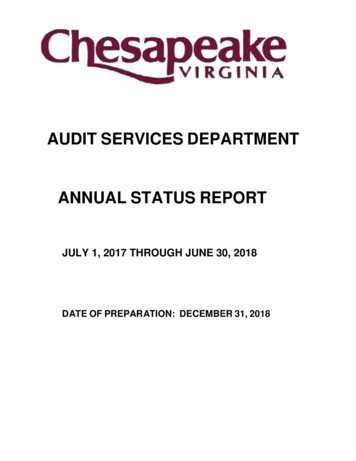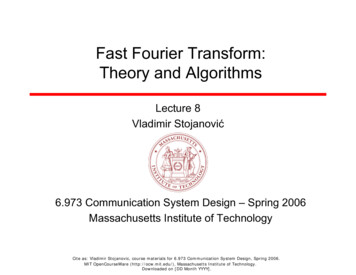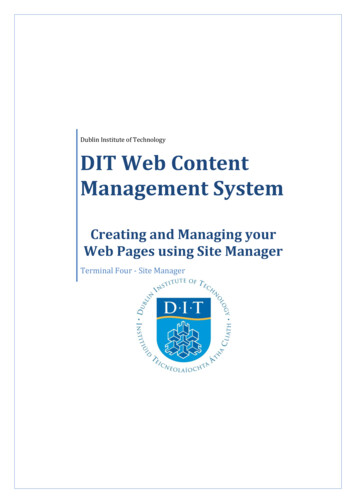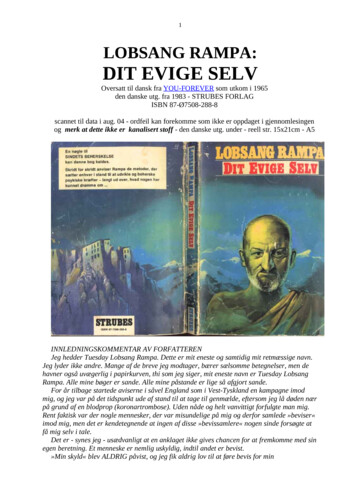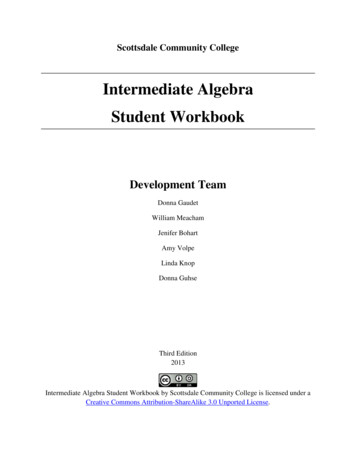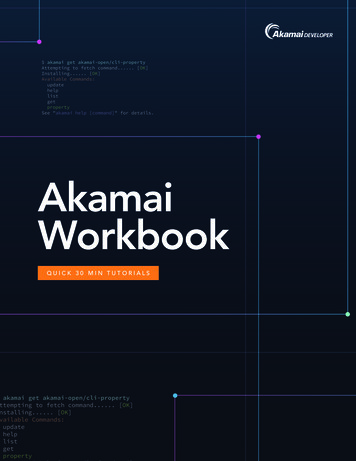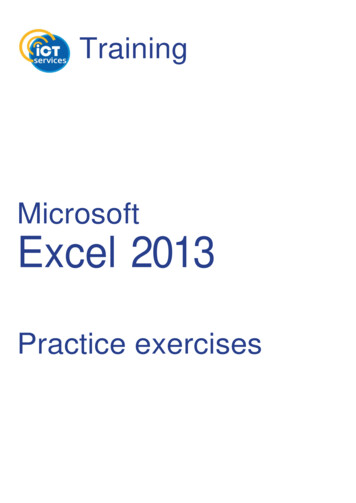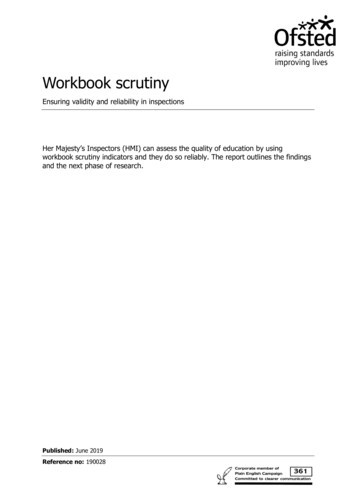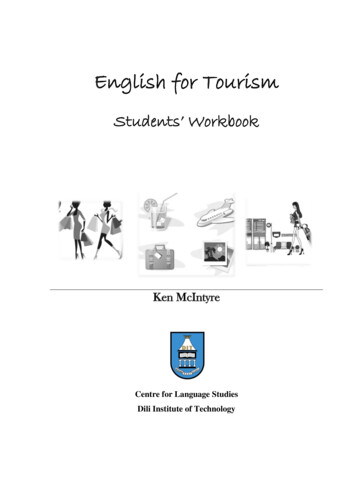
Transcription
English for TourismStudents’ WorkbookKen McIntyreCentre for Language StudiesDili Institute of Technology
2013 Centre for Language StudiesDili Institute of TechnologyDili, Timor Leste.www.tetundit.tlISBN 978-989-8615-07-7
TABLE OF CONTENTS1. AT THE AIRPORT . 11.1Vocabulary: arriving and departing. 21.2International signs . 31.3Dialogue: At the airport (2.00pm) . 41.4Information on an airline ticket . 51.5Reading an advertisement . 61.6Postcards from Singapore and Amsterdam . 71.7Countries, nationalities and food . 81.8Exercise: WH questions . 91.9‘Should’ / ‘shouldn’t’ . 91.10A postcard from Amsterdam . 112. TIMETABLES AND SCHEDULES . 122.1Time and time differences . 122.2Vocabulary: Arrival and departure . 132.3Airline timetable. 142.4Time prepositions . 162.5‘Open’ and ‘closed’ . 162.6Exercise: Verb tense . 203. AT THE HOTEL . 213.1Vocabulary: Hotels . 223.2Countable and uncountable nouns. 233.3Vocabulary: Accommodation I . 243.4Text: Maria’s holiday . 253.5‘Some’ and ‘any’ . 263.6Vocabulary: Accommodation II . 263.7Crossword: Capital cities . 273.8Vocabulary: Tourism. 283.9Vocabulary: Hotel room . 283.10Dialogue . 293.11Exercise: ‘WH’ questions. 293.12Vocabulary exercise . 303.13Late for work . 314. AT THE RESTAURANT . 324.1Dialogue: The trainee chef . 334.2Vocabulary: in the restaurant . 34i
4.3Text: Hong Kong . 354.4Speaking practice. 364.5Exercises: ‘WH’ questions . 364.6Compounds with ‘some’ and ‘any’ . 374.7Crossword: mixed . 384.8‘both . and’, ‘either . or’, ‘neither . nor’. 394.9Text: In the restaurant . 405. TRAVEL DOCUMENTS .415.1Boarding pass . 425.2Filling in a form . 435.3A departure card . 445.4Text: Italy . 475.5Exercise: ‘any’, ‘some’, ‘much’, ‘many’ . 485.6Crossword: Tourism . 495.7Culture: Doing business in Timor Leste . 505.8Exercise: Asking questions . 516. CHARTS AND GRAPHS .526.1Maria’s guest house . 536.2Exercise: conjunctions ‘and’, ‘or’, ‘but’ . 556.3Hotel Guests . 566.4Prepositions for prices . 576.5Crossword: Around the hotel . 587. WRITING .597.1Rules of punctuation . 607.2Formal and informal writing. 627.3Writing a basic business letter . 637.4Writing a covering letter for a job application. 647.5Arranging a letter . 667.6A job advertisement . 677.7Conjunctions . 687.8Exercises: Comparatives. 697.9Writing emails . 708. GRAMMAR .74ii8.1Simple present tense . 748.2Present continuous tense. 758.3Simple Past Tense. 778.4Present Perfect . 78
8.5Forming yes-no questions . 798.6‘WH’ question words . 808.7Forming ‘WH’ questions. 818.8Forming negatives . 818.9List of irregular verbs . 838.10Comparisons . 858.11Uncountable nouns, ‘many’, ‘much’ and ‘a lot of’ . 868.12Definite and indefinite articles . 878.13‘Some’ and ‘any’ . 888.14Compounds with ‘some’ and ‘any’ . 898.15Prepositions with time . 898.16Conjunctions: ‘and’, ‘or’, ‘but’ . 908.17‘Both . and’, ‘either . or’, ‘neither . nor’. 918.18Conjunctions: ‘because’, ‘so’, ‘therefore’; ‘although’/ ‘even though’ . 918.19Conjunctions of time . 92iii
1. AT THE AIRPORTI’m late.This is wherepassengerscollect theirbaggage.Here’s yourticket sir.Have a goodflight.Thankyou.Welcome to EastTimor1
1.1 Vocabulary: arriving and departingInsert the correct word from the box into the gaps.customs officercheck incollectiontravel documents1.departure loungeimmigration officerbaggage allowanceimmigrationcarry-on bagbaggagequeuevisaWhen you arrive in a country from overseas the . checks yourpassport. In some countries you must have a . before you canenter. Then you proceed to the . area to pick-up your bags andthen to the . who may, (but not always) check your baggage.2.When you leave a country you must first . with the airline toget your boarding pass. If there are a lot of people you must .Then you go through ., where they check your traveldocuments and then to the . to wait for your flight.3.On most international flights you have a . of 20 kilograms perperson. Many airlines allow you to take one bag on to the aircraft usually a maximum weightof 7 kg. This is called a .Study the paragraph above and answer the following questions.21.What word means ‘abroad’?2.What are ‘travel documents’?3.What word means ‘go in’?4.What are ‘international flights’?5.Can you name some ‘airlines’?6.What word means ‘no more than’?7.What is another word for ‘plane’?8.What is another word for ‘depart’?9.What words mean ‘for each’?
1.2 International signsFor each sign, write short answers to these questions:1.Where would you find these signs?2.What do these signs mean?3.Have you seen these signs around Dili?12345678Discuss: Are signs useful? Why? Why not?3
1.3 Dialogue: At the airport (2.00pm)Complete the dialogue by inserting the correct tense. Look for time phrases first.Practice the dialogue with a friend.Bill:Hi, Ben where . (go)?Ben :Hi Bill, I . (fly) to China later this afternoon.Bill:. (go) for business or pleasure?Ben :Business, I . (meet) some engineers tomorrow in Shanghai.Bill:How long . (stay) there?Ben :I . (stay) for three weeks and then I . (fly) toKorea. I . (stay) in Korea until the end of the year and thenI . (come) back.Bill:. (be) this your first overseas trip?Ben :No, I . (go) to Indonesia last year and the year before that I. (travel) to India.Bill:Anyway, why . (be) you here?Ben :I . (pick up) some visitors from America.They . (come) from Darwin but the plane . (be)30 minutes late so instead of arriving at 2 o’clock they . (now, arrive) at2.30pm. Americans . (be) always late.They . (be) never on time.Bill:I . (hope) your listening skills are good because Americans. (be) difficult to understand. They . (have) astrong accent and they . (speak) very loudly.Ben:I . (hope) they understand me. I . (practice) mypronunciation every night in front of the mirror.Bill:4. (not, forget) ‘practice makes perfect’.
1.4 Information on an airline ticketAt the airportPlease make sure you are at the airport in time and remember to carry proof of identity and youre-ticket with you as security may wish to see them.BaggageIf travelling without bags then be at the gate 20 minutes before the flight departs. If you've got bag(s)to check, be at a bag tag counter no later than 30 minutes before departure. The first two bags are free.On board you're allowed one bag per person (maximum 7 kg).Changes/restrictionsChanges permitted at any time. You may have to pay the difference between the original fare and thenew fare if higher. Service fee applies unless changed online.CancellationUp to the day of departure, fully refundable. After the day of departure refunds will incur a refund feeper person per one-way journey.ExerciseFrom the information, what do you think the following expressions mean?1.proof of identity : .2.e-ticket: .3.to check: .4.tag: .5.original: .6.fee: .7.online: .8.fully refundable : .ExerciseRead the information and answer these questions:1.Can a passenger change a ticket? . .2.How many bags can a passenger take on board? .3.If I change my ticket on the internet do I have to pay an extra charge? .5
1.5 Reading an advertisementTIMOR LOROSA’E AIRLINELow cost flights to Asia from Dili.Book in advance for even lower fares.Discount for people under 25 years old.BALIfrom 70(one way)DARWINfrom 150 *(return)Book now by calling 73338459Prices do not include airport taxes.Maximum baggage allowance 25 kg.Excess baggage charge 25 per kilo.Tickets are non-refundable and nontransferable.* Special conditions apply.Find words and phrases from the advertisement which mean the same as:61.A single ticket: .2.A ticket to go and come back: .3.Less expensive fares: .4.Extra luggage: .5.Young people pay less: .6.You cannot change your ticket: .7.Reserve: .8.A good price if you buy your ticket early: .
1.6 Postcards from Singapore and AmsterdamExerciseInsert the correct tense of the verbs given.Hi Maria,I . (write) this letter from Singapore airport. I . (sit) in a small coffeeshop and I . (wait) for my flight to Paris. My flight . (depart) at4.30pm and the trip . (take) about 12 hours. I . (not, look) forward tothe flight, it . (be) too long.I . (go) to Paris last year and . (stay) in a very small hotel in thecentre of town. It . (be) very noisy and I . (not, sleep) well.It . (be) too cold. This time I . (stay) in Paris for a few daysand then I . (take) the train to Amsterdam.See you later,Your friend Mario.Hi Maria,I . (arrive) in Amsterdam at 10.30am this morning. It . (be) very coldand it . (snow). All the passengers on the train . (speak) Dutch andI . (not, understand) a word. It . (take) about three and a half hoursfrom Paris to here. I . (buy) lunch on the train but it . (not, be) verygood and it . (be) expensive too. It . (not, be) good value for money.Now I . (be) very tired. At the moment I . (wait) for a taxi.I . (be) sorry about my writing but my hands . (be) so cold.I . (wear) a woollen hat to keep my head and my earswarm. I . (look forward) to a good night’s sleep after all the travelling.Best regards,Mario7
1.7 Countries, nationalities and foodWhen we talk about countries, nationalities and food, we must use the correct parts of speech. The country name is a noun. For the people, food, language and nationality, use the adjective form.For /IndonesianSingapore/SingaporeanKorea/Korean aysianJapan/JapaneseI come from Japan and I speak Japanese.My sister lives in Australia and she has married an Australian.Excuse me I am looking for a French restaurant.In our hotel we have three Korean tourists and five tourists from Canada.ExerciseDelete the incorrect word and write in the correct word.1.My brother has gone to study . (Chinese/China)in . (Chinese/China).2.My motor cycle was made in . (Japan/Japanese).3.The instructions have been written in . (France/French).4.At our school we have three students from . (Chinese/China) five from. (English/England) and ten from . (Australian/Australia). Theyall like to eat . (Japan/Japanese) food.5.Most of the visitors in our hotel come from . (America/American).6.My favourite place to eat is the . (Chinese/China) restaurant next to the. (Chinese/China) Embassy.7.We have a new guest staying in the hotel. She is travelling on a. (Europe/European) passport but she has a strong. (American/America) accent.8
1.8 Exercise: ‘WH’ questionsRead sections 8.6 and 8.7 about ‘WH’ questions. Then write questions to find the informationunderlined. (Remember to check the verb tense.)1.They were picked up at 11 o’clock.2.I take size 7 shoes.3.We are flying with Merpati Airline.4.Maria has gone to a meeting.5.We are going to Baucau by bus.6.The tour group arrived at 11 o’clock.7.The taxi cost me ten dollars.8.We are staying for a week.9.You are working on reception tomorrow.10. Those three suitcases are mine.1.9‘Should’ / ‘shouldn’t’Should is a modal verb. It is used to give advice and to make recommendations. Should is not asstrong as must. Both should and must are always used before another verb; that other verb must be inthe infinitive. You should speak to the manager.You must speak to the manager.You shouldn’t use your mobile phone when driving.You mustn’t use your mobile phone when driving. It is a good idea (Diak liu.). There is no alternative (tenki). Polite advice (Diak liu la bele.). Prohibition (La bele).9
ExerciseComplete the sentences with should or shouldn’t.1.It looks like rain. You . take an umbrella.2.It is too far to walk. I think we . take a taxi to the beach.3.We are lost. I think we . ask someone for directions.4.Who . we ask about the cost of a room?5.To find out whether there is a vacancy, you . ask the hotel receptionist.ExerciseWrite five sentences giving advice to a tourist visiting Dili.1.You should .2.You should .3.You should .4.You shouldn’t .5.You shouldn’t .ExerciseMatch sentences 1–5 with sentences a – e.101.What should I do when I start work?a. We shouldn’t guess.2.You shouldn’t use a hammer.b. You should sign in.3.We should read the instructions first.c. You should use a screwdriver.4.You shouldn’t forget your helmet.d. We should meet at the ANZ Bank.5.Where should I meet you?e. You should protect yourself.
1.10 A postcard from AmsterdamExerciseIn section 1.6, Mario wrote that he was going to Amsterdam. Here is his next postcard. He wrote it inAmsterdam at 10.30am.Fill in the blanks with the correct tense of the verb given. Remember to look at the time phrases.Hi Maria,This . (be) my last postcard from Amsterdam. I . (sleep) well lastnight and I . (get up) for an early breakfast this morning. I . (receive)your text thanks. I . (be) here for nearly a week now. How time. (fly)! It . (be) a very busy city but the people . (be)friendly. The weather . (also, be) a lot better over the past few days. Last night I. (have) dinner in an exclusive restaurant and a fly . (land) in my soup.I . (not, know) what to do. I . (try) to explain to the waiter but he. (not, understand) what I . (say). Anyway, I . (not,finish) the soup. This afternoon I . (go) to the famous Rijksmuseum. I. (always, want) to go there.My flight . (leave) at 11.00pm tonight and so I . (order) a taxi for9.00pm. I . (pack) my bags last night and I . (find) a few extra dollarsso I . (buy) a few more souvenirs.See you laterMario xxx.11
2. TIMETABLES AND SCHEDULES2.1 Time and time differencesThere are two styles for stating the time: The 12 hour clock. This is the most common time style for everyday use.e.g. 8 o’clock, 8.30 am. The 24 hour clock. This is most often used for timetables and schedules.e.g. 20.00 hours, 08.30 hoursFor times before 10 o’clock, add ‘oh’ before the number of hours. (In the army and police force,people often say ‘zero’ instead.)If there are minutes, then say the number of hours followed by the number of minutes.When there are no minutes, then say the number hundred hours.12 HOUR TIME7.30 am10.00am1.00pm6.15pm11.05pm24 HOUR TIME07.30 hours10.00 hours1
Korea/Korean Japan/Japanese I come from Japan and I speak Japanese. My sister lives in Australia and she has married an Australian. Excuse me I am looking for a French restaurant. In our hotel we have three Korean tourists and five tourists from Canada. Exercise De
